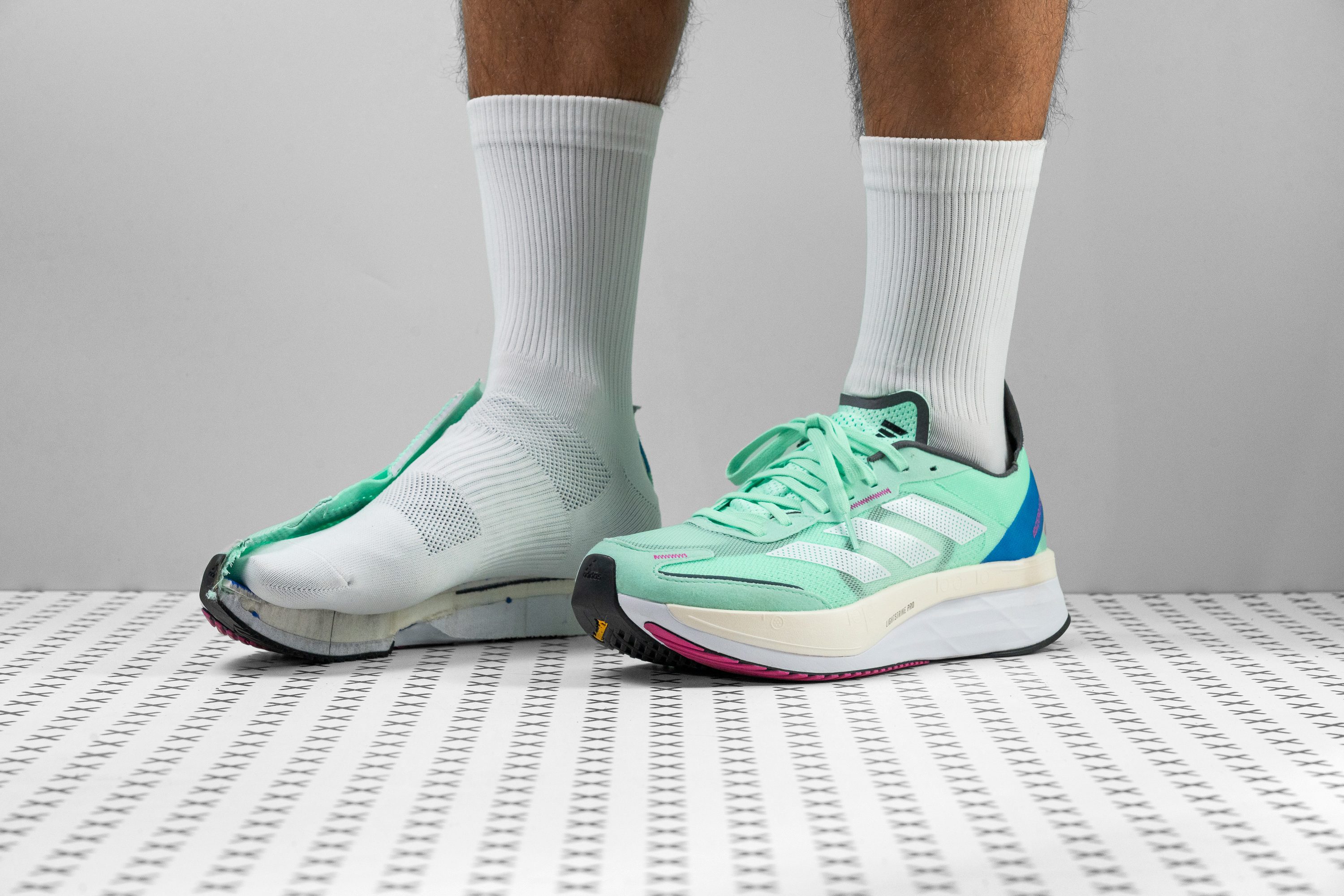Our verdict
Pros
- Very stable for being a high-stack shoe
- Excellent grip
- Breathable upper
- Versatile for different workouts
- Protective underfoot
- Extremely durable outsole
- Made with recycled materials
- Attractive design
Cons
- Definitely stiff and firm
- Long breaking-in period
Audience verdict
Comparison
The most similar running shoes compared
+ + Add a shoe | |||||
|---|---|---|---|---|---|
| Audience score | 83 Good! | 91 Superb! | 89 Great! | 85 Good! | |
| Price | $160 | $160 | $160 | $180 | |
| Pace | Tempo | CompetitionTempo | Tempo | Tempo | |
| Shock absorption | - | Moderate | High | High | |
| Energy return | - | Moderate | Moderate | High | |
| Traction | - | High | High | High | |
| Arch support | Neutral | Neutral | Neutral | Neutral | |
| Weight lab Weight brand | 10.2 oz / 290g 9.6 oz / 272g | 9 oz / 254g 9 oz / 255g | 9.5 oz / 268g 9.5 oz / 269g | 9.8 oz / 278g 9.8 oz / 278g | |
| Drop lab Drop brand | 9.8 mm 8.5 mm | 6.0 mm 6.0 mm | 10.1 mm 10.0 mm | 7.3 mm 6.0 mm | |
| Strike pattern | HeelMid/forefoot | Mid/forefoot | Heel | Mid/forefoot | |
| Size | True to size | True to size | Slightly small | Slightly small | |
| Midsole softness | Balanced | Balanced | Soft | Soft | |
| Difference in midsole softness in cold | Normal | Normal | Normal | Normal | |
| Toebox durability | Bad | Decent | Decent | Bad | |
| Heel padding durability | Decent | Good | Decent | Good | |
| Outsole durability | Good | Good | Decent | Decent | |
| Breathability | Moderate | Moderate | Moderate | Moderate | |
| Width / fit | Wide | Medium | Narrow | Medium | |
| Toebox width | Wide | Narrow | Narrow | Medium | |
| Stiffness | Stiff | Moderate | Stiff | Stiff | |
| Torsional rigidity | Stiff | Stiff | Stiff | Stiff | |
| Heel counter stiffness | Moderate | Stiff | Flexible | Moderate | |
| Plate | Carbon plate | Carbon plate | Carbon plate | Carbon plate | |
| Rocker | ✓ | ✓ | ✗ | ✓ | |
| Heel lab Heel brand | 39.1 mm 39.5 mm | 34.3 mm 36.0 mm | 37.4 mm 39.0 mm | 36.8 mm 41.0 mm | |
| Forefoot lab Forefoot brand | 29.3 mm 31.0 mm | 28.3 mm 30.0 mm | 27.3 mm 29.0 mm | 29.5 mm 35.0 mm | |
| Widths available | NormalWide | NormalWide | NormalWide | NormalWide | |
| Orthotic friendly | ✓ | ✓ | ✓ | ✓ | |
| Season | All seasons | All seasons | All seasons | All seasons | |
| Removable insole | ✓ | ✓ | ✓ | ✓ | |
| Ranking | #502 Bottom 26% | #27 Top 8% | #106 Top 28% | #203 Bottom 47% | |
| Popularity | #617 Bottom 9% | #194 Bottom 49% | #50 Top 14% | #34 Top 9% |
Who should buy
Consider choosing the Adidas Adizero Boston 11 if you:
- Struggle with stability and need a shoe that can handle a wide range of paces
- Are looking for a durable shoe that can handle races and don't mind it being heavier than racing shoes
- Seek a cushioned-yet-firm ride for long-distance training sessions
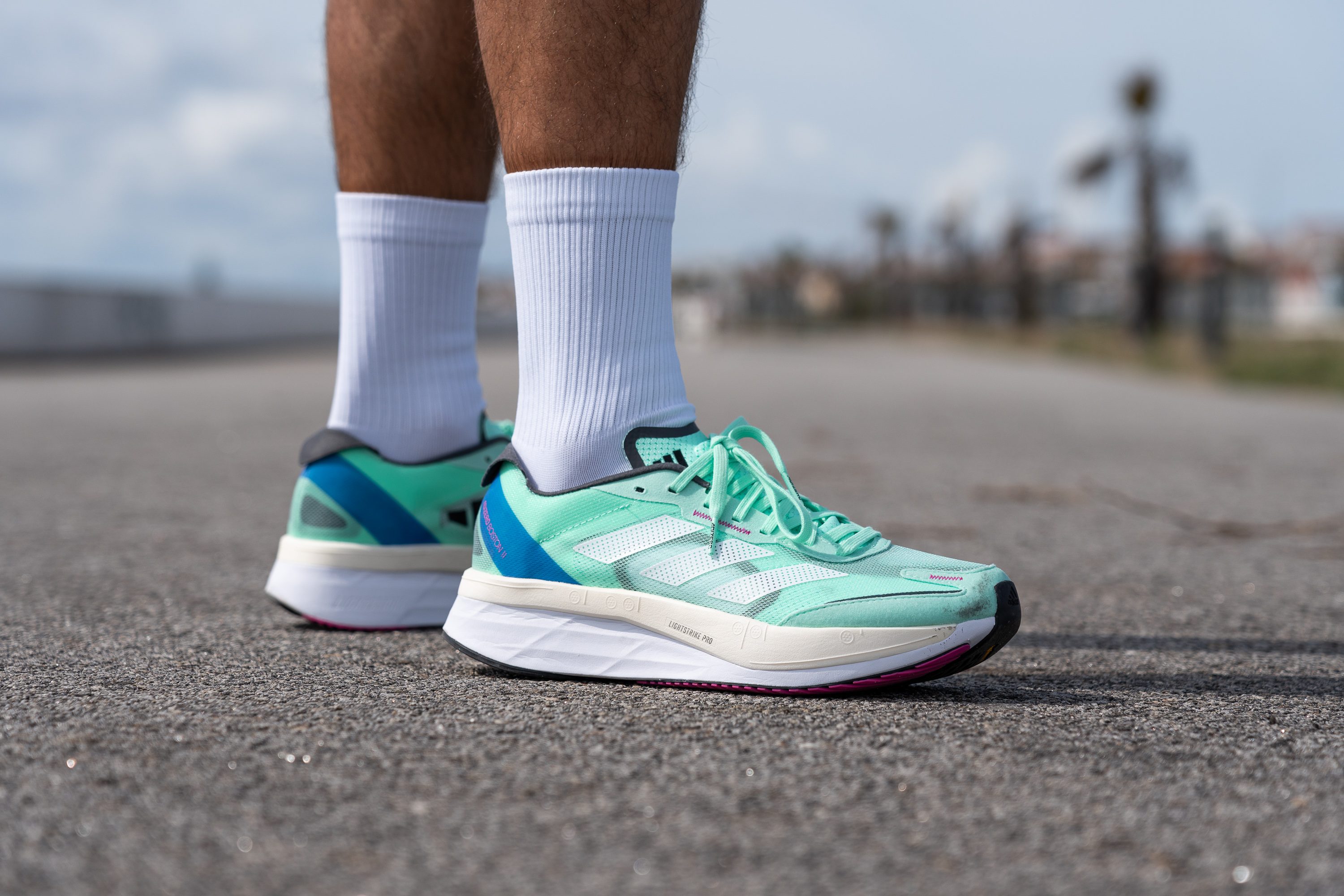
Who should NOT buy
If you prefer plush or even moderately soft foams, we suggest staying away from the Boston 11. The same advice goes for those in search of flexible running shoes, as this one leans towards firmness and rigidity with its Energyrods.
For moderate-to-slow paces, consider the ASICS Novablast 3. It's a fast-and-light daily trainer that comfortably handles a wide range of speeds. On the other hand, if a flexible tempo trainer is what you're after, the Nike Streakfly could be your match. It's fast, agile, and incredibly soft while maintaining excellent flexibility.
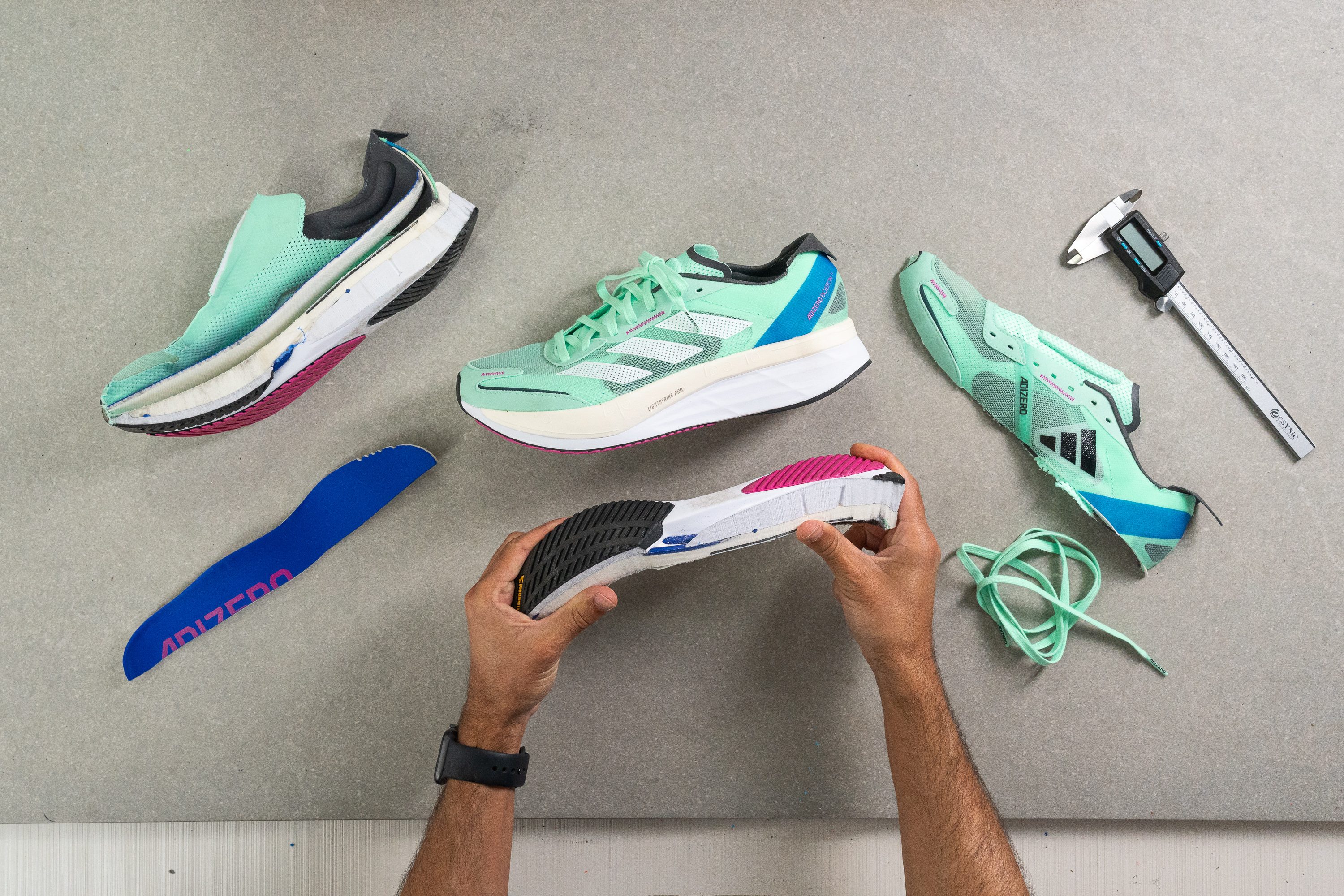
Cushioning
Heel stack
With a stack height height of 39.1 mm, the Boston 11 just falls within the World Athletics regulation of 40 mm, making it a legal shoe for racing.
We think it's a good option for almost any heel striker that seeks a high-yet-stable shoe, but it's not a great competition shoe, though.
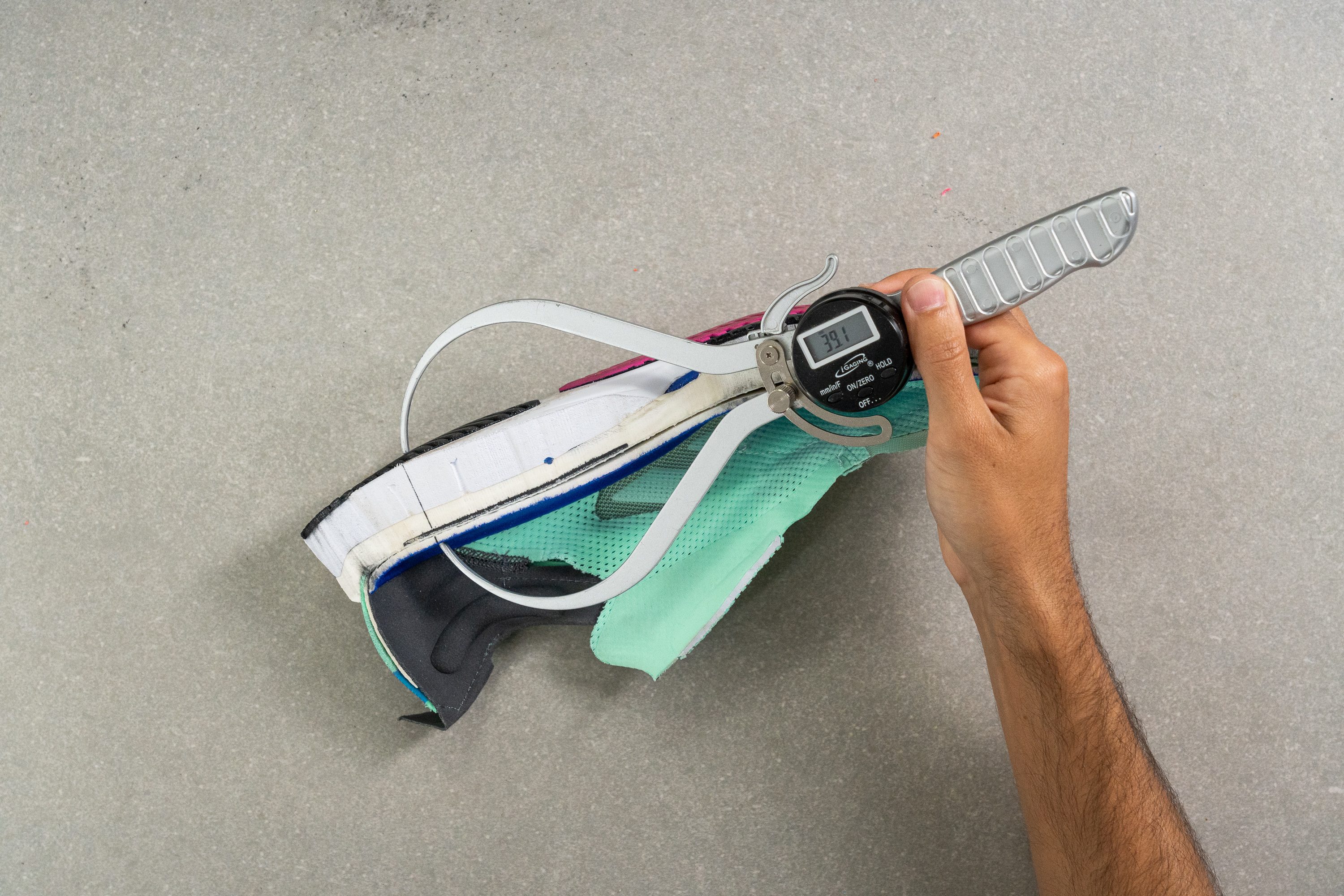
| Adizero Boston 11 | 39.1 mm |
| Average | 34.8 mm |
Forefoot stack
There's also a significant level of cushioning in the forefoot of the shoe, as our precise measurements reveal it to be 29.3 mm.
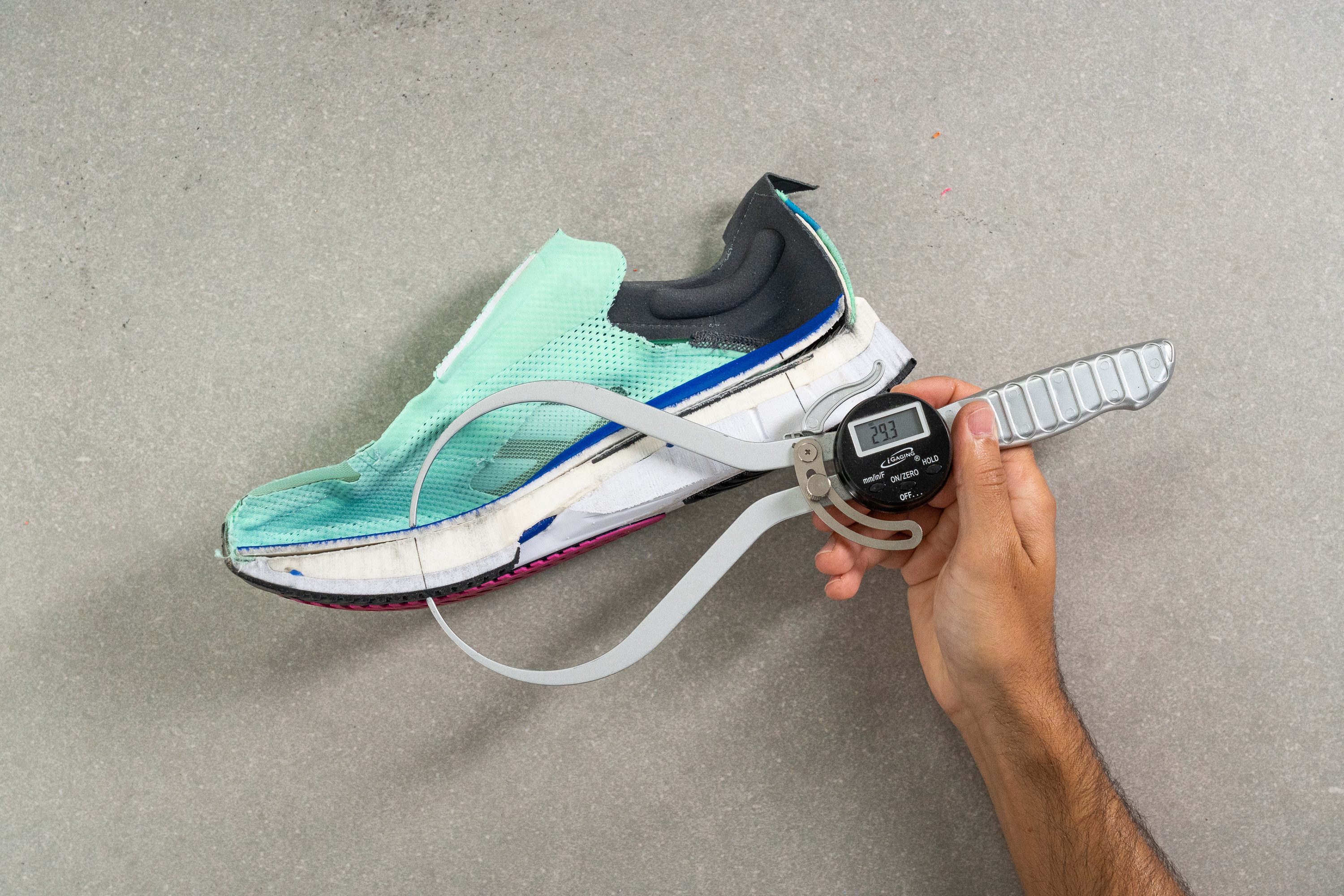
| Adizero Boston 11 | 29.3 mm |
| Average | 26.2 mm |
Drop
This leads to a drop that's typical for Adidas shoes—at 9.8 mm.
So, even though the brand's official numbers indicates an 8.5 mm drop, we discovered it to be slightly steeper. This feature makes the shoe particularly well-suited for heel strikers, as a higher heel-to-toe drop facilitates the transition towards the midfoot and forefoot.
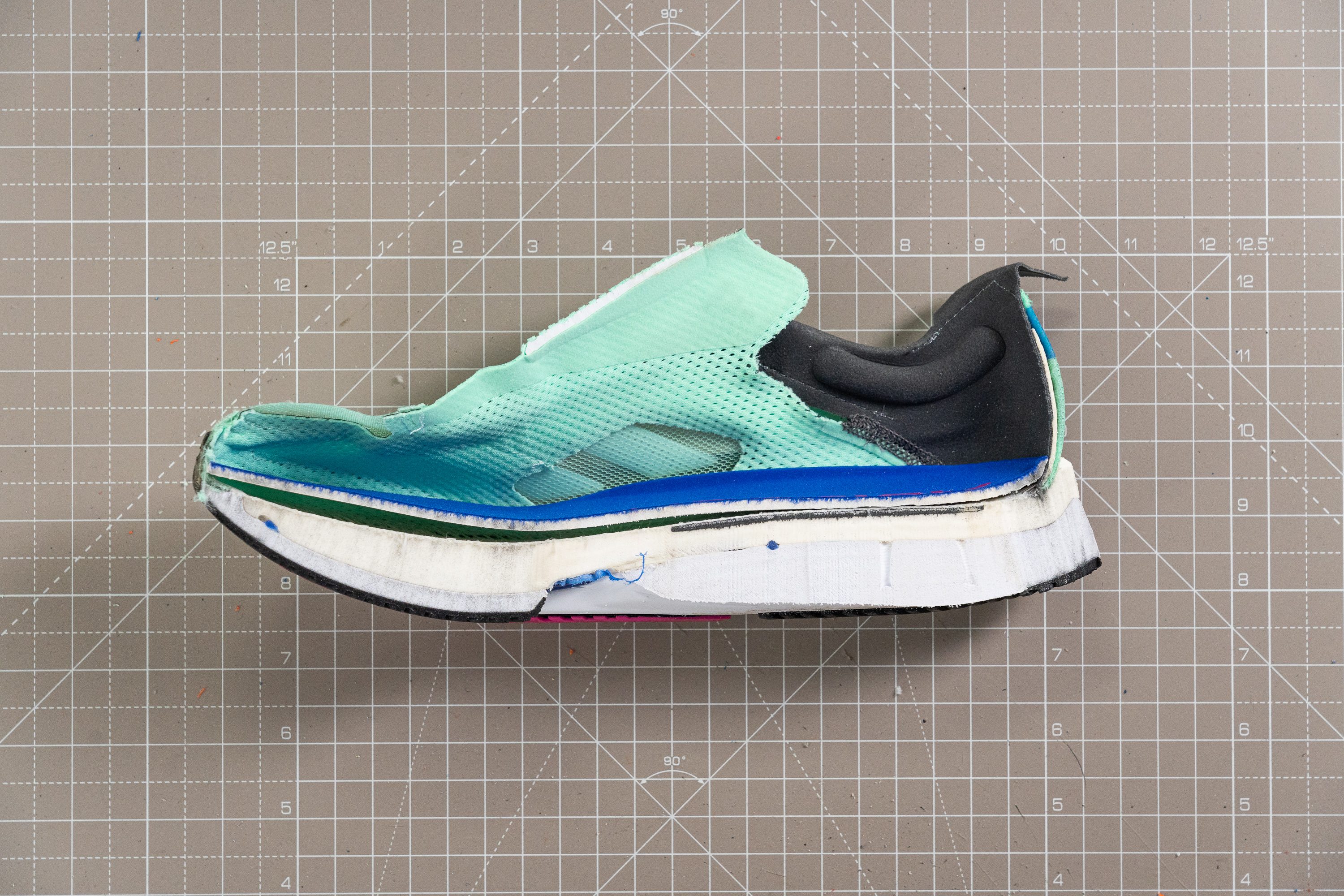
| Adizero Boston 11 | 9.8 mm |
| Average | 8.6 mm |
Midsole softness
The Adidas Boston 11 makes use of two distinct foams:
- Lightstrike is a standard EVA foam that, to us, feels notably firm. It doesn't have much bounce, but it does contribute to a stable ride.
- Lightstrike Pro, on the other hand, is the premier foam in Adidas' arsenal, boasting impressive energy return.
We clocked the hardness of Lightstrike at 22.0 HA, but it felt significantly firmer to us during our test runs.
That's because Lightstrike is renowned for having a really long break-in period, so expect a very firm ride for a while.
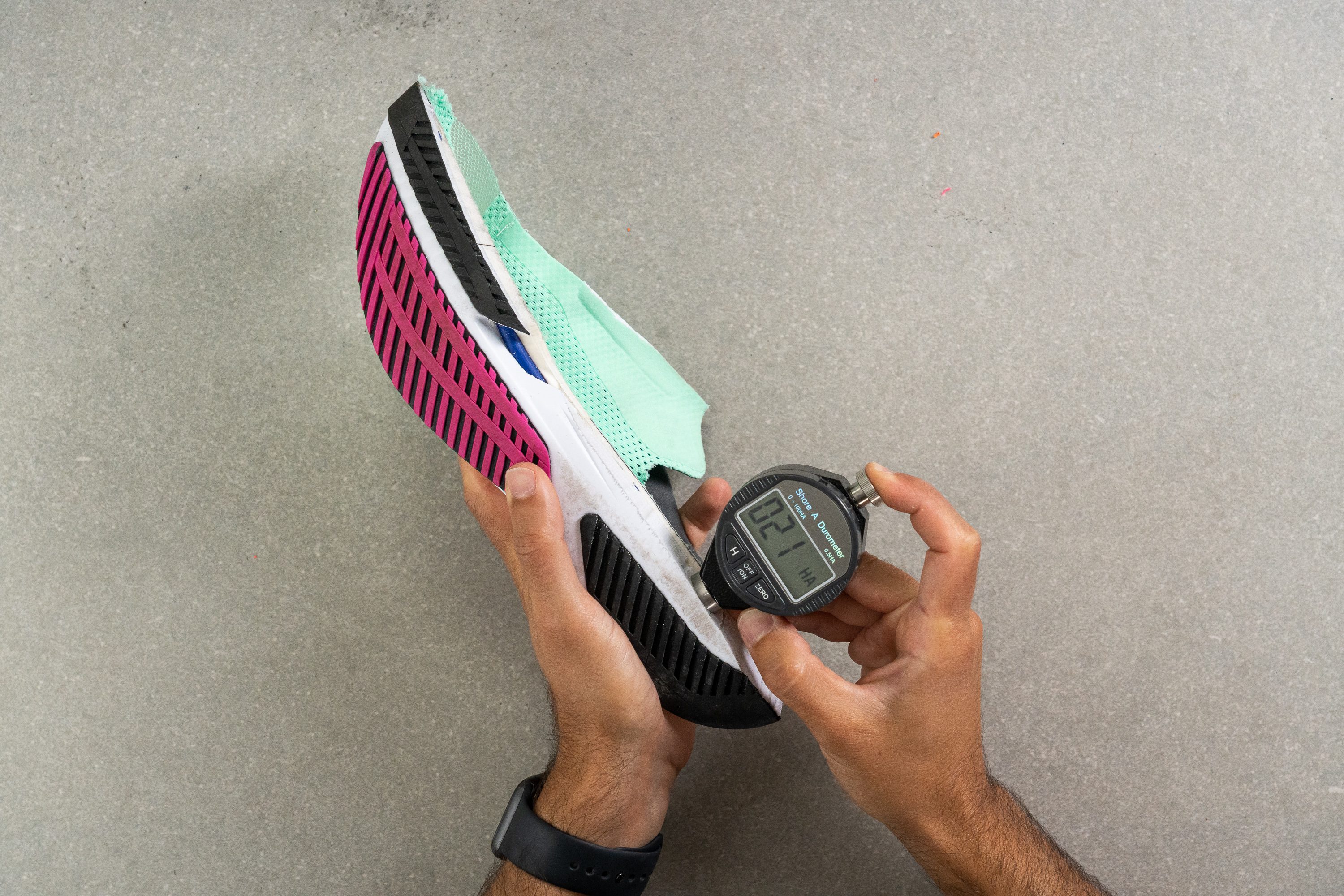
| Adizero Boston 11 | 22.0 HA |
| Average | 20.4 HA |
Secondary foam
Lightstrike Pro is the secondary foam that Adidas employs to inject this shoe with bounce, energy return, and speed.
Even though we measured its hardness at 23.5 HA, which is technically firmer than Lightstrike, it felt quite the opposite to us. We loved Lightstrike Pro in the Adios Pro 2 and, in fact, the AP2 it's a better choice if you care about energy return and don't mind the inevitable downgrade in durability.
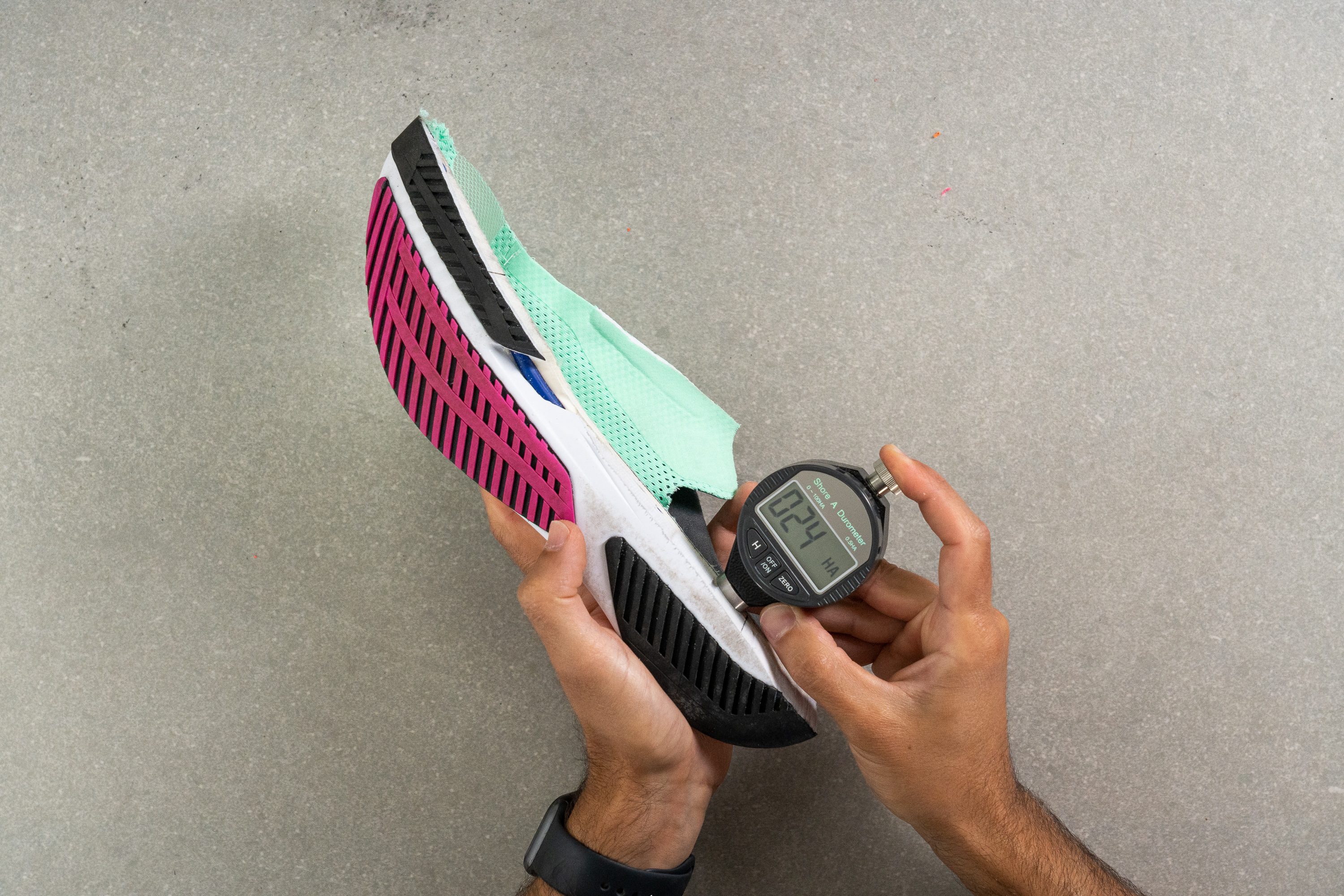
| Adizero Boston 11 | 23.5 HA |
| Average | 22.7 HA |
Size and fit
Size
Adidas Adizero Boston 11 fits true to size (29 votes).
Internal length
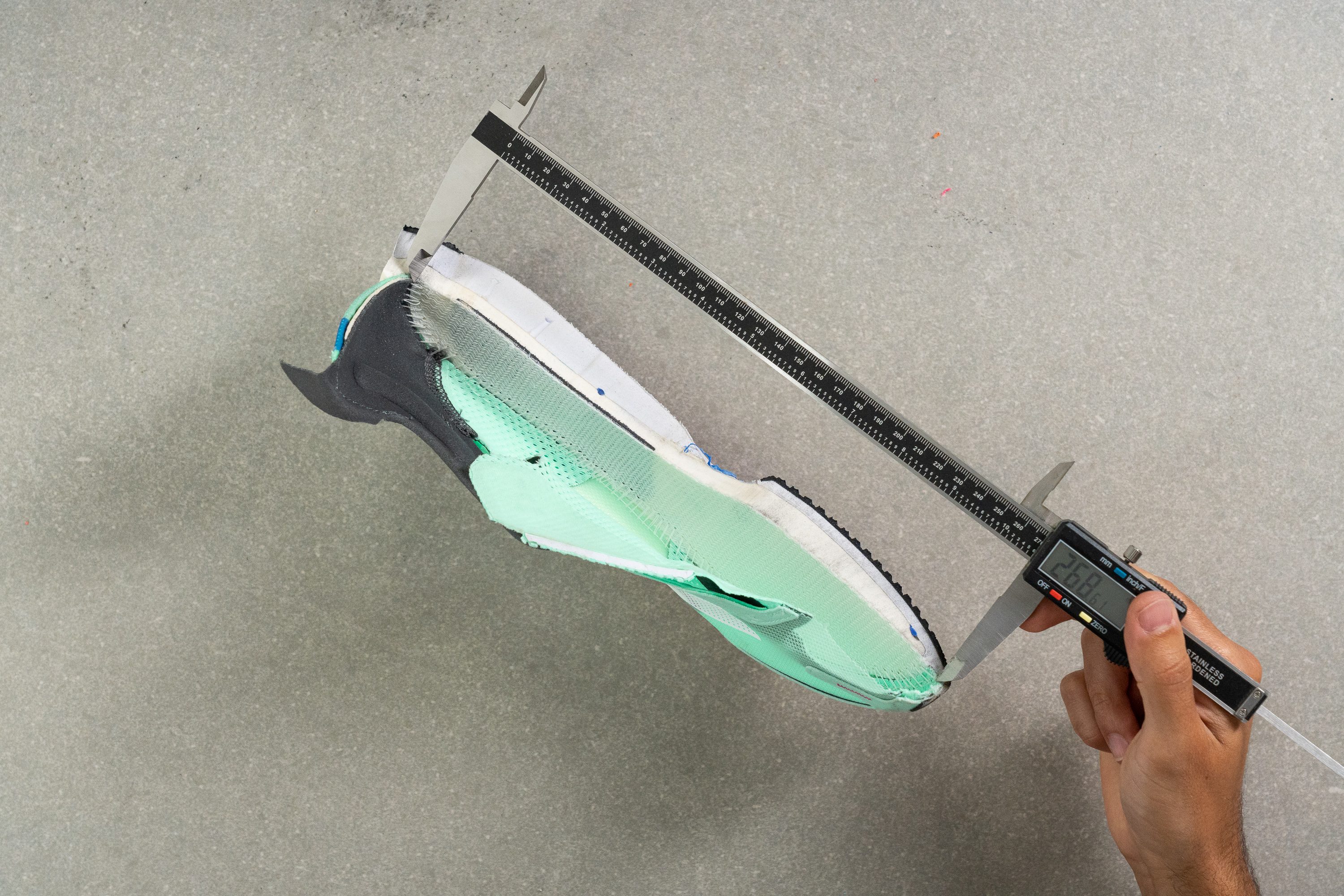
| Adizero Boston 11 | 268.6 mm |
| Average | 269.4 mm |
Toebox width - widest part
Following our field testing and precise measurements of the upper, we're can confirm that the Boston 11 is an excellent, roomy choice for those with wide feet. Thumbs up for those 103.7 mm!
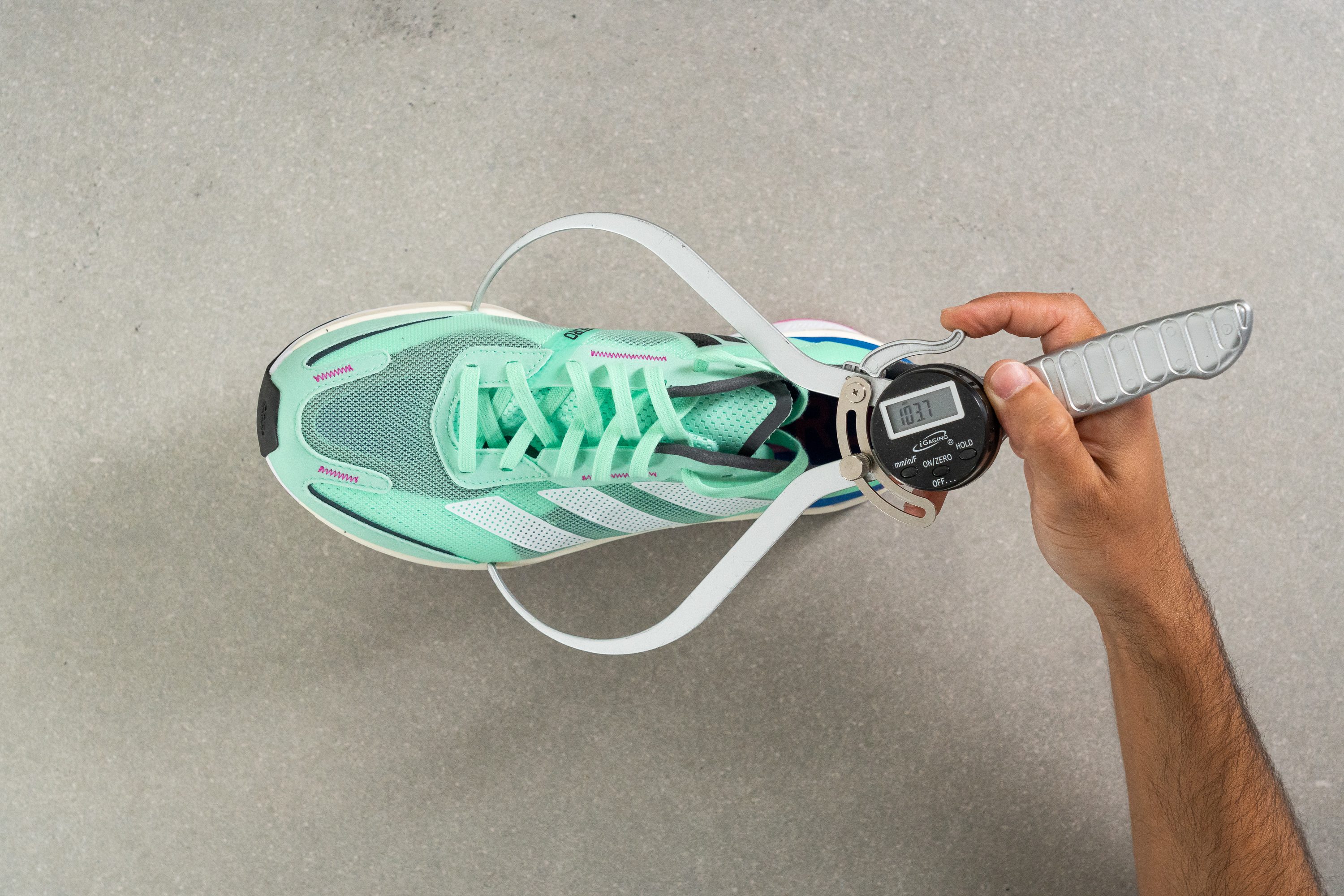
This test follows an older methodology, which is why you don't see recently tested shoes in the chart. Results from different methodologies can not be compared.
| Adizero Boston 11 | 103.7 mm |
| Average | 98.5 mm |
Toebox width - big toe
There's even more good news for those of us blessed (?) with wide feet.
From our in-depth evaluations, we can confidently affirm that the Boston 11 is an excellent fit for those whose toes do not have significant size variation, such as those with Celtic, German, or Roman foot shapes—forming a near-perfect match.
For a deeper understanding of foot shapes and uppers, we strongly encourage you to explore our guide about uppers.
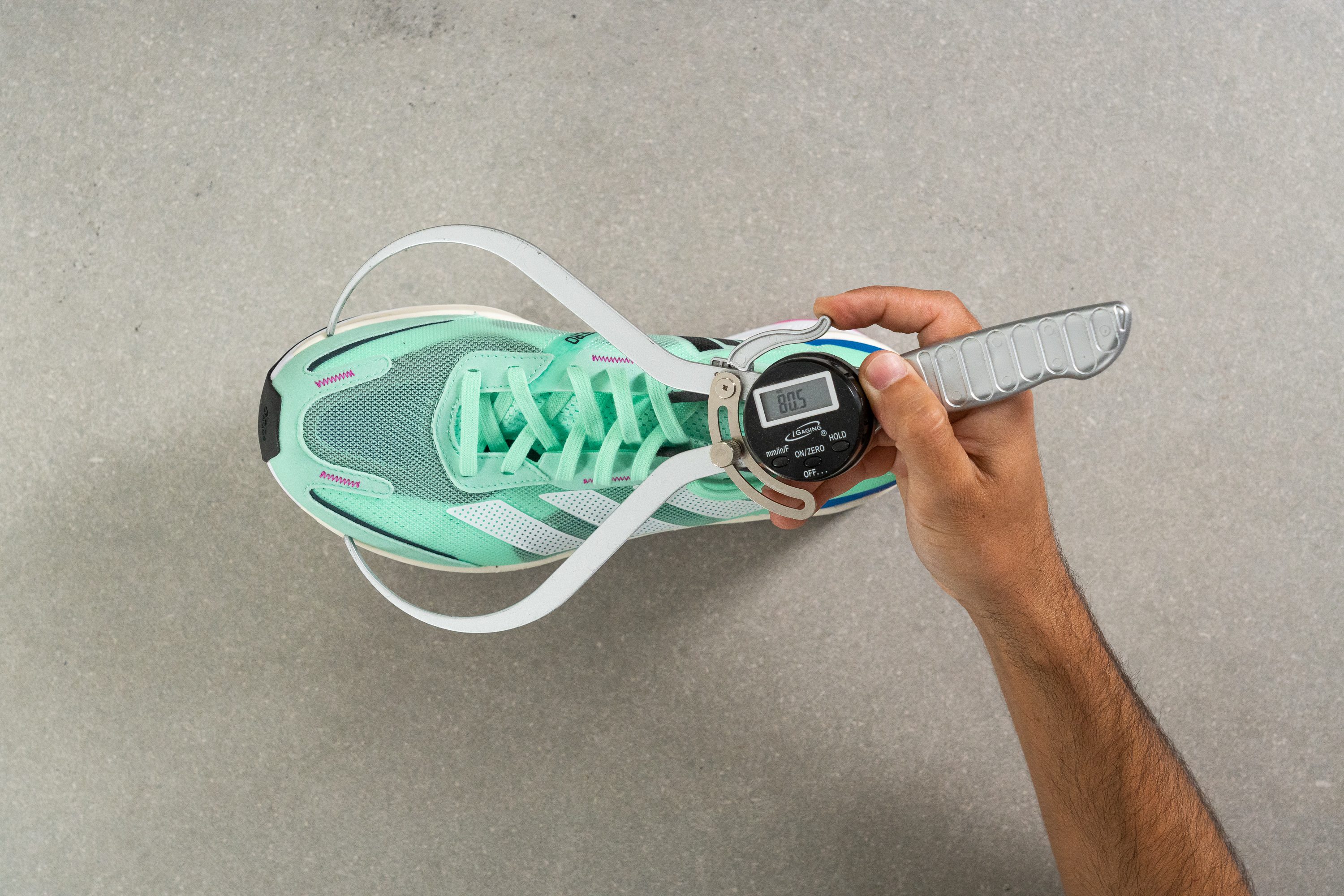
This test follows an older methodology, which is why you don't see recently tested shoes in the chart. Results from different methodologies can not be compared.
| Adizero Boston 11 | 80.5 mm |
| Average | 78.4 mm |
Flexibility / Stiffness
By now, it's clear that we're dealing with a stiff shoe. However, we really LOVE testing shoes in our lab and wanted to put a number on it.
So, we performed a 90-degree bend test and got a higher-than-average result of 35.3N.
This test follows an older methodology, which is why you don't see recently tested shoes in the chart. Results from different methodologies can not be compared.
| Adizero Boston 11 | 35.3N |
| Average | 28.1N |
Stiffness in cold (%)
We also put the shoe's stiffness to the test after a freezer-cooling session, just like we did for the midsole softness.
The EVA-based Lightstrike foam, once again, showed significant change under cold conditions. This time, we recorded a stiffer reading of 50.1N.
This shows a substantial 42% difference between the two measurements.
The change is quite noticeable, leading us to conclude that this shoe might not be the best choice for running in colder weather.
| Adizero Boston 11 | 42% |
| Average | 33% |
Weight
Sporting a thick midsole, we quickly realized we were dealing with a chunky shoe. Adidas tried to lighten the load with a simpler upper design, but it wasn't enough.
Disappointingly, the shoe still tips the scale over the mental barrier of 10 oz—it weighs in at 10.2 oz or 290g. Let's hope that Adidas improves this issue in the Boston 12.
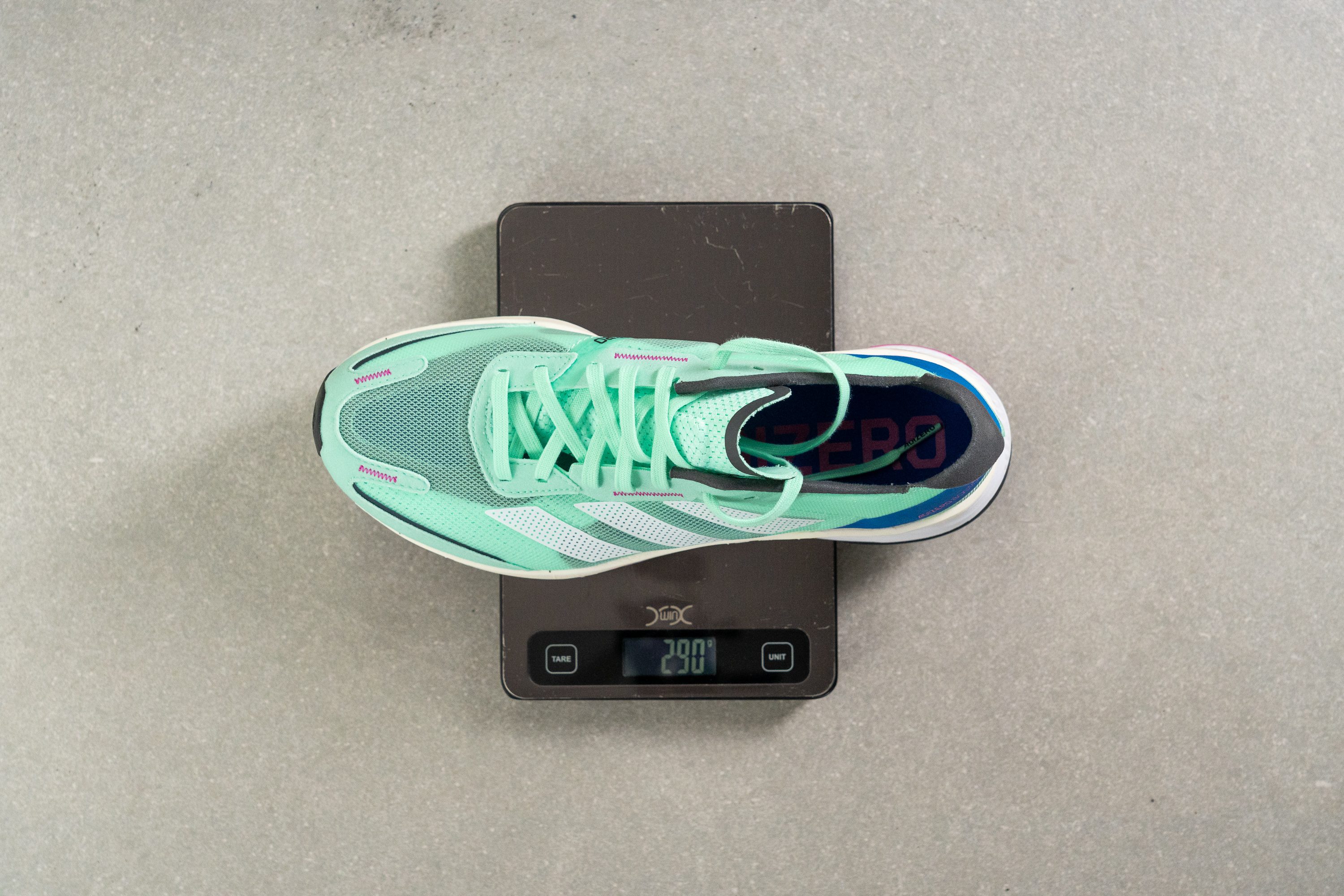
| Adizero Boston 11 | 10.2 oz (290g) |
| Average | 9.3 oz (264g) |
Breathability
The Boston 11 handles summer runs without a hitch. The moment we got our hands on the shoe and felt the upper with our fingers, we were impressed by its thin, breathable engineered mesh.
Despite this, we didn't give it a full 5/5 score in our jaw-dropping smoke test—we settled for a 4. You might be wondering why—the reason lies with the shoe's tongue.
While the toebox plays a crucial role in breathability, discomfort can arise if other parts of the shoe don't allow for heat and humidity to escape.
Though the medial part of the Boston 11 offers sufficient breathability—a fact confirmed by our light test—the tongue could potentially be a problem on the hottest days.
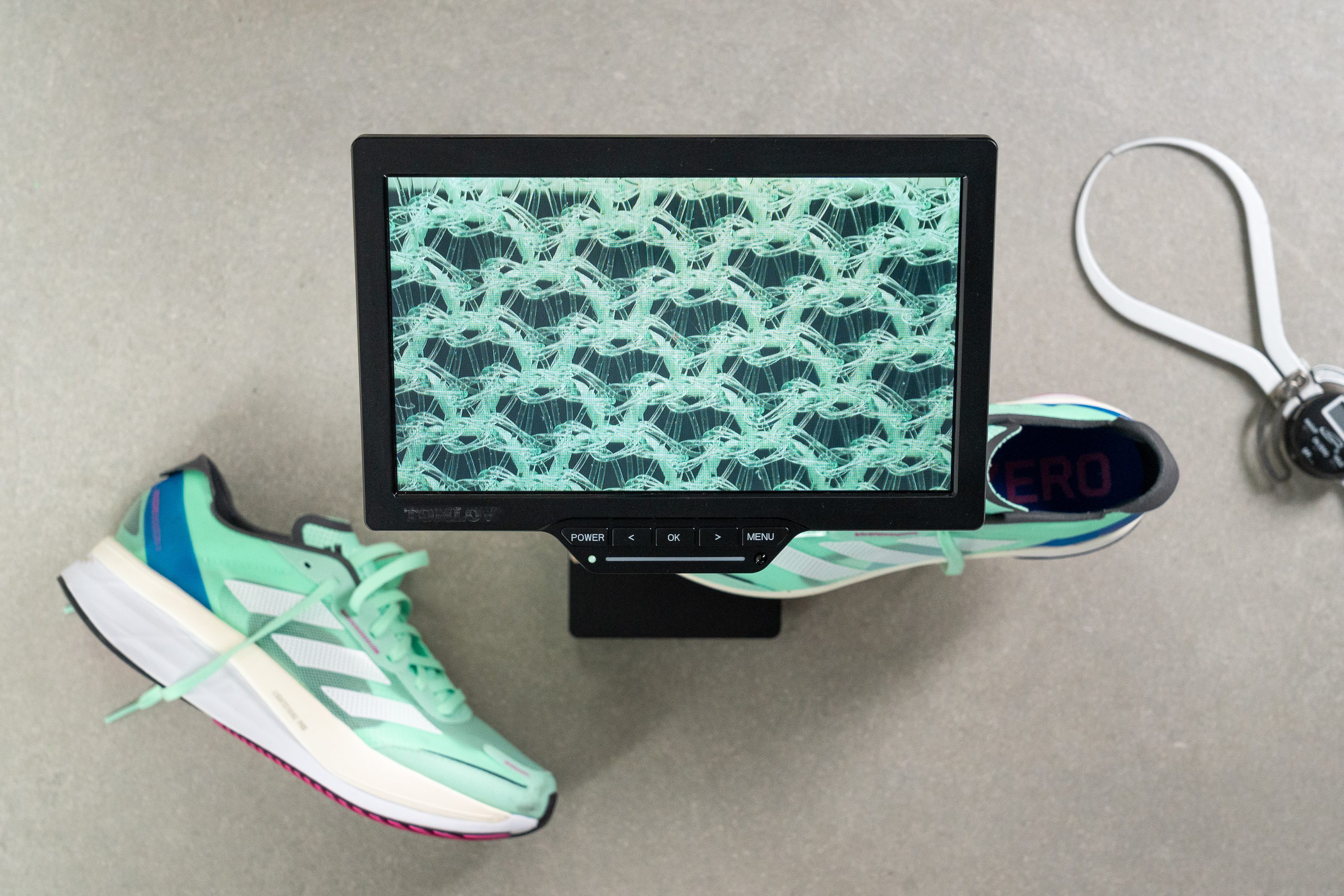
Even so, when it comes to breathability, let us be clear: this shoe is superb—99% of runs should pose no problem.
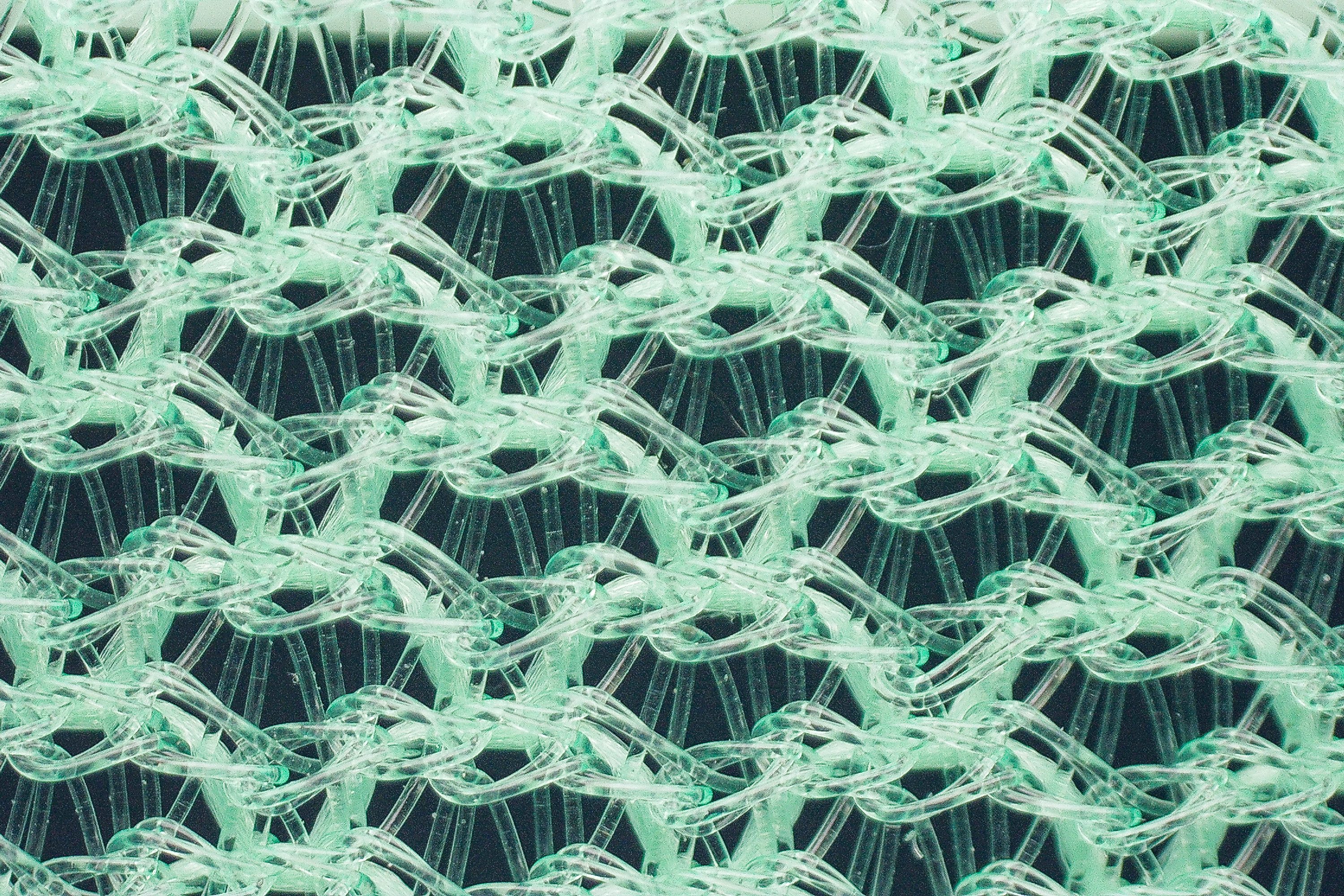
Our observations in the lab reinforced our initial impressions. Under the microscope, we found a strikingly thin mesh—a true testament to precise manufacturing—that allowed for extraordinary airflow.
| Adizero Boston 11 | 4 |
| Average | 3.7 |
Stability
Lateral stability test
Despite its significant stack height, we find the Boston 11 surprisingly stable.
Torsional rigidity
This stability is due to its carbon plate, Adidas' fiberglass Energyrods, and the firm foam we mentioned earlier.
That's also why we rated this shoe at 4/5 in our torsional rigidity test. It really felt stiff to us.
| Adizero Boston 11 | 4 |
| Average | 3.5 |
Heel counter stiffness
The same principle applies to the heel counter. Adidas is simply making an effort to increase stability, offsetting the high-stack height's potential side-effects.
| Adizero Boston 11 | 3 |
| Average | 2.9 |
Midsole width - forefoot
In our lab, we found the midsole width to be 109.3 mm.
This measurement is less than what we initially anticipated for this shoe, but it still provides enough stability for runners who land on their midfoot or forefoot, even in the fastest tempo runs.
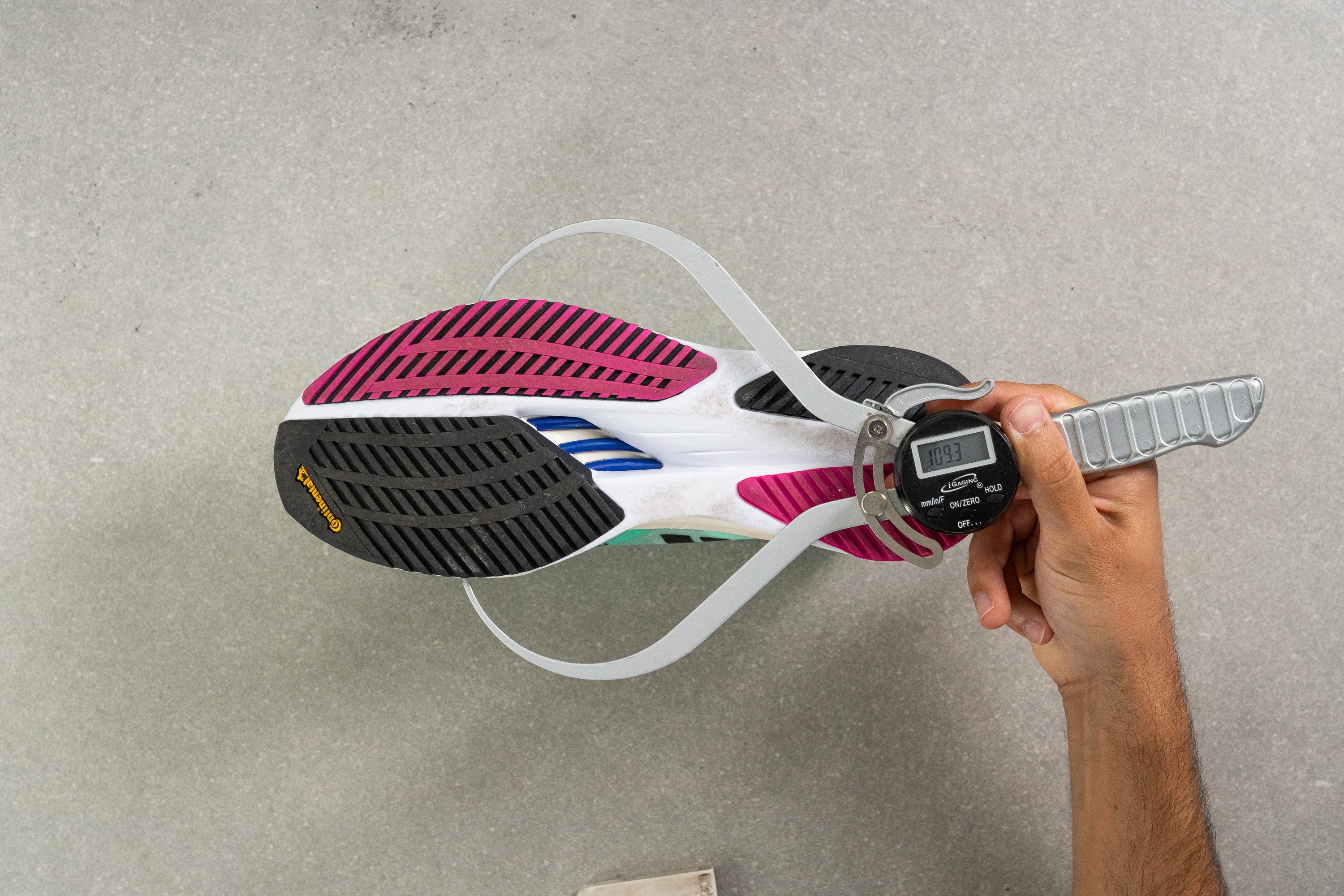
| Adizero Boston 11 | 109.3 mm |
| Average | 114.4 mm |
Midsole width - heel
The heel tells a similar tale. Once again, it seems like Adidas prioritized weight savings. If they had made the shoe as wide as the average training shoe, it could have ended up 10% or 20% heavier.
The narrower design could potentially compromise the shoe's stability and comfort for some heel strikers.
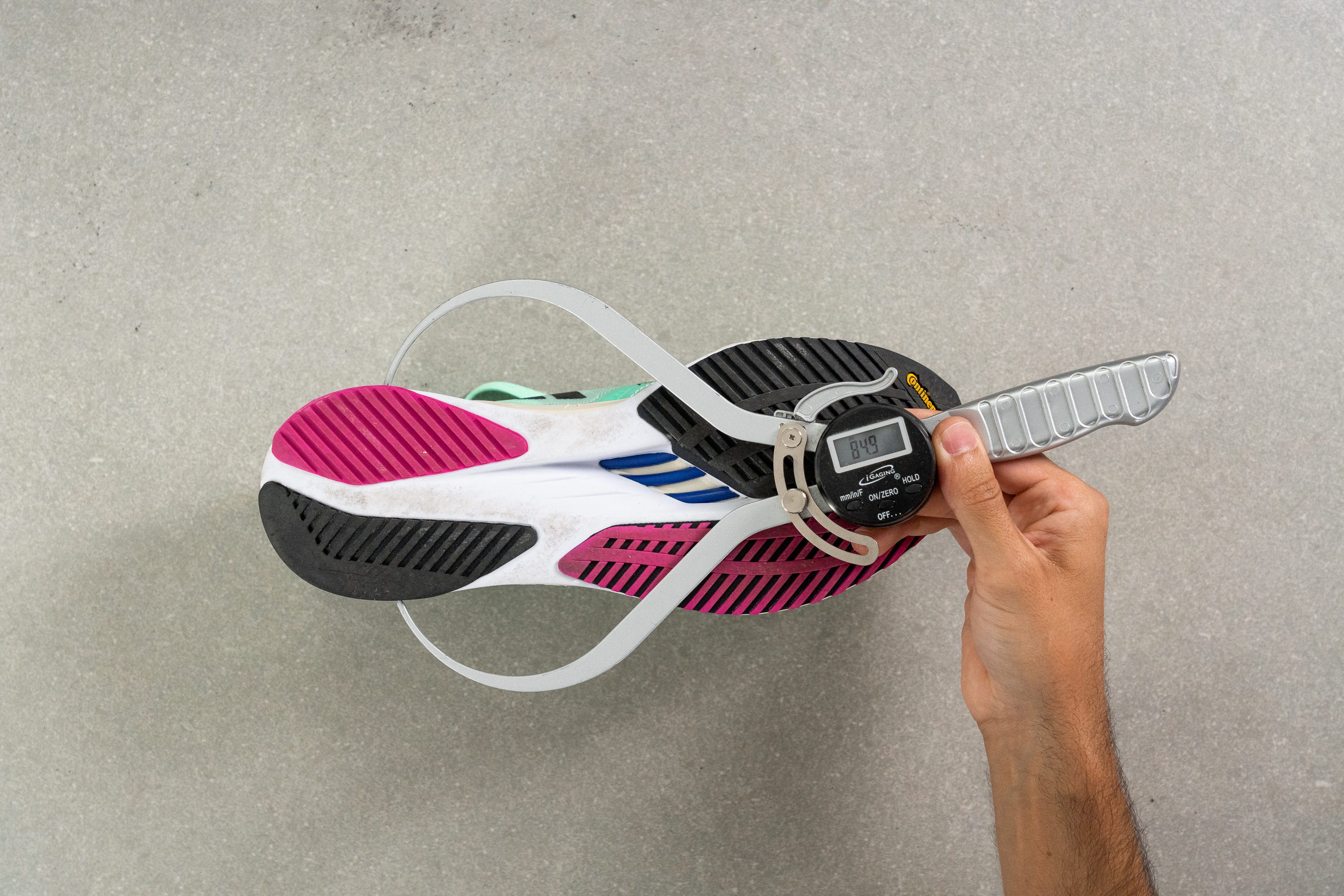
| Adizero Boston 11 | 84.9 mm |
| Average | 90.6 mm |
Durability
Toebox durability
The Boston 11 employs an engineered mesh that exhibits outstanding breathability, as we've previously noted. However, this material falls short when it comes to durability—it's highly susceptible to wear and tear.
Our dremel test, which applies a force of 3.4N for four seconds to every shoe in the lab, really put the Boston 11 through the wringer. The hyper-thin layer of mesh offered almost no resistance at all.
We strongly believe Adidas could up their game in this regard in the v12. Of course, a thinner mesh typically has less robustness compared to a thicker one, but consider the Nike Alphafly 2. This model also sports a thin, competition-focused and breathable layer, yet it doesn't compromise on durability.
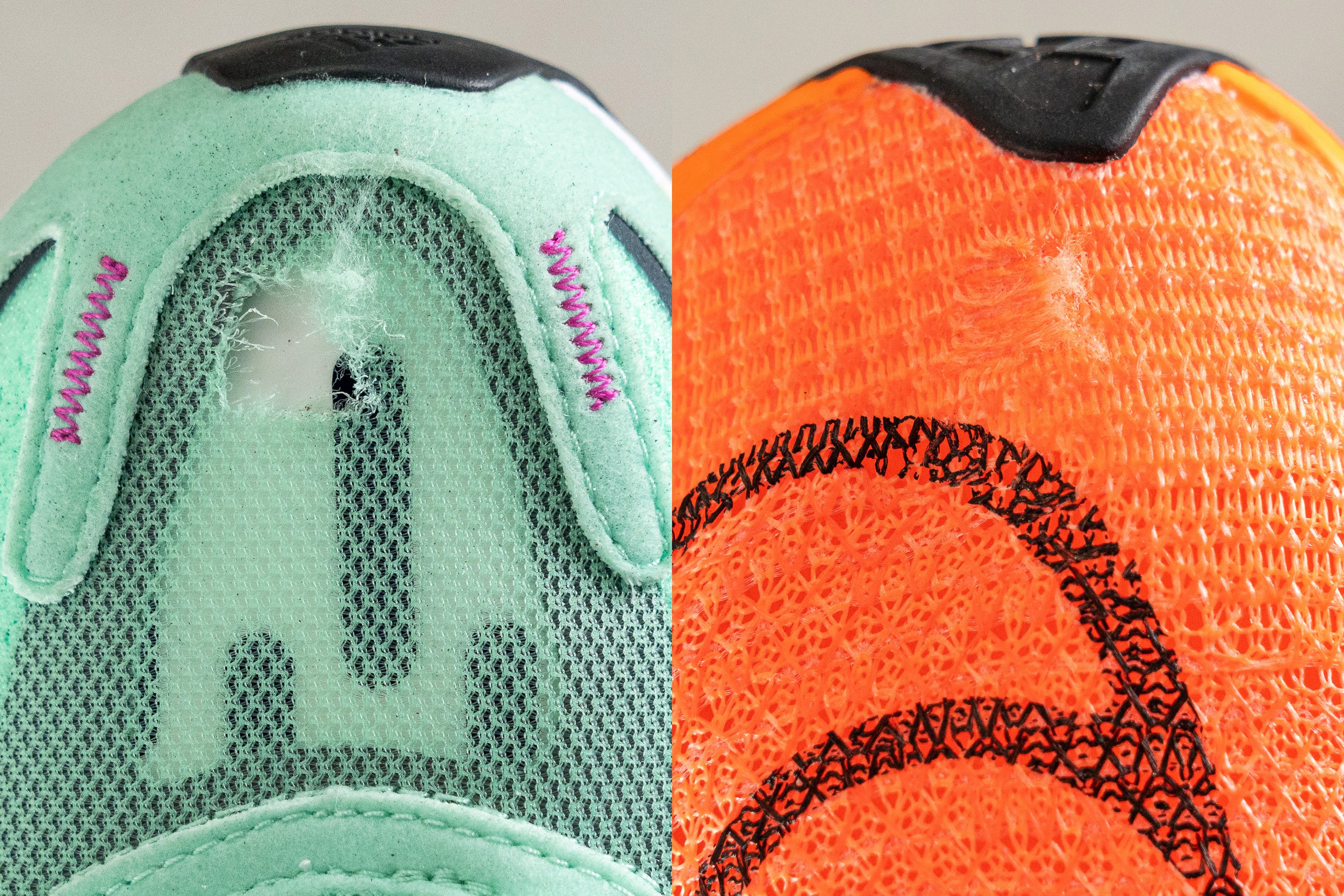
| Adizero Boston 11 | 1 |
| Average | 2.6 |
Heel padding durability
Luckily, the Boston 11's heel padding is really great. This is good news for runners who often wear holes in this area.
Our tough Dremel test on the soft fabric that Adidas uses in this area showed it holds up really well.
| Adizero Boston 11 | 3 |
| Average | 3.4 |
Outsole hardness
A standout feature of Adidas's Continental rubber is its exceptional grip, even though it's a hard compound.
This is a rare quality, as most brands need to use softer rubber to ensure a good level of traction. Adidas and Continental shine in this unique, hard-yet-grippy approach.
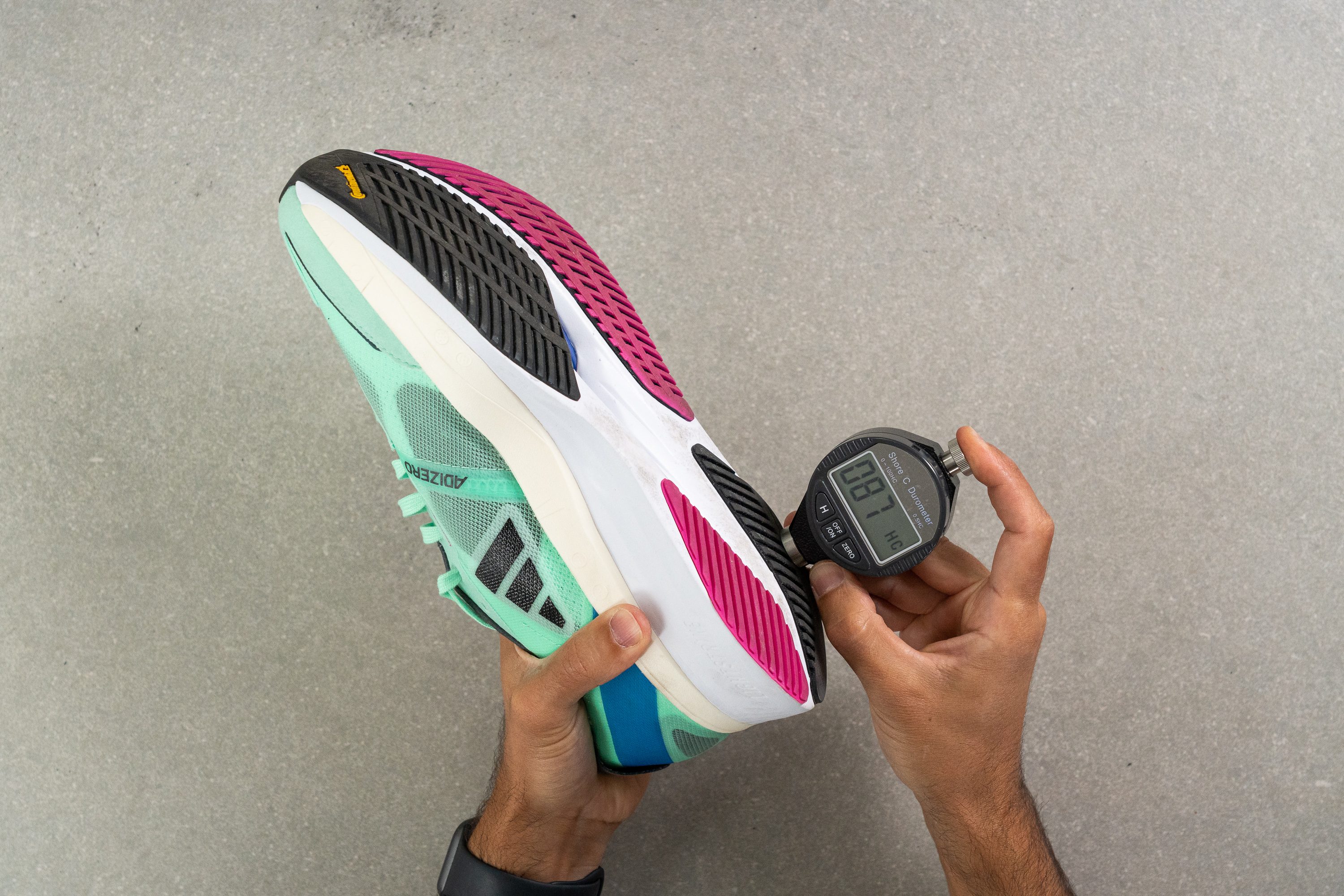
| Adizero Boston 11 | 86.3 HC |
| Average | 79.2 HC |
Outsole durability
We put our trusty Dremel to work once more—this time on the outsole—and found only a minimal 0.74 mm wear in the rubber. This is an excellent result pointing to the shoe's long-term durability.
This shoe truly stands the test of time.
| Adizero Boston 11 | 0.7 mm |
| Average | 1.1 mm |
Outsole thickness
With a thickness of 3.3 mm, the rubber on the shoe is pretty standard, but it's so sturdy that you're likely to wear out many other parts of the shoe before the outsole.
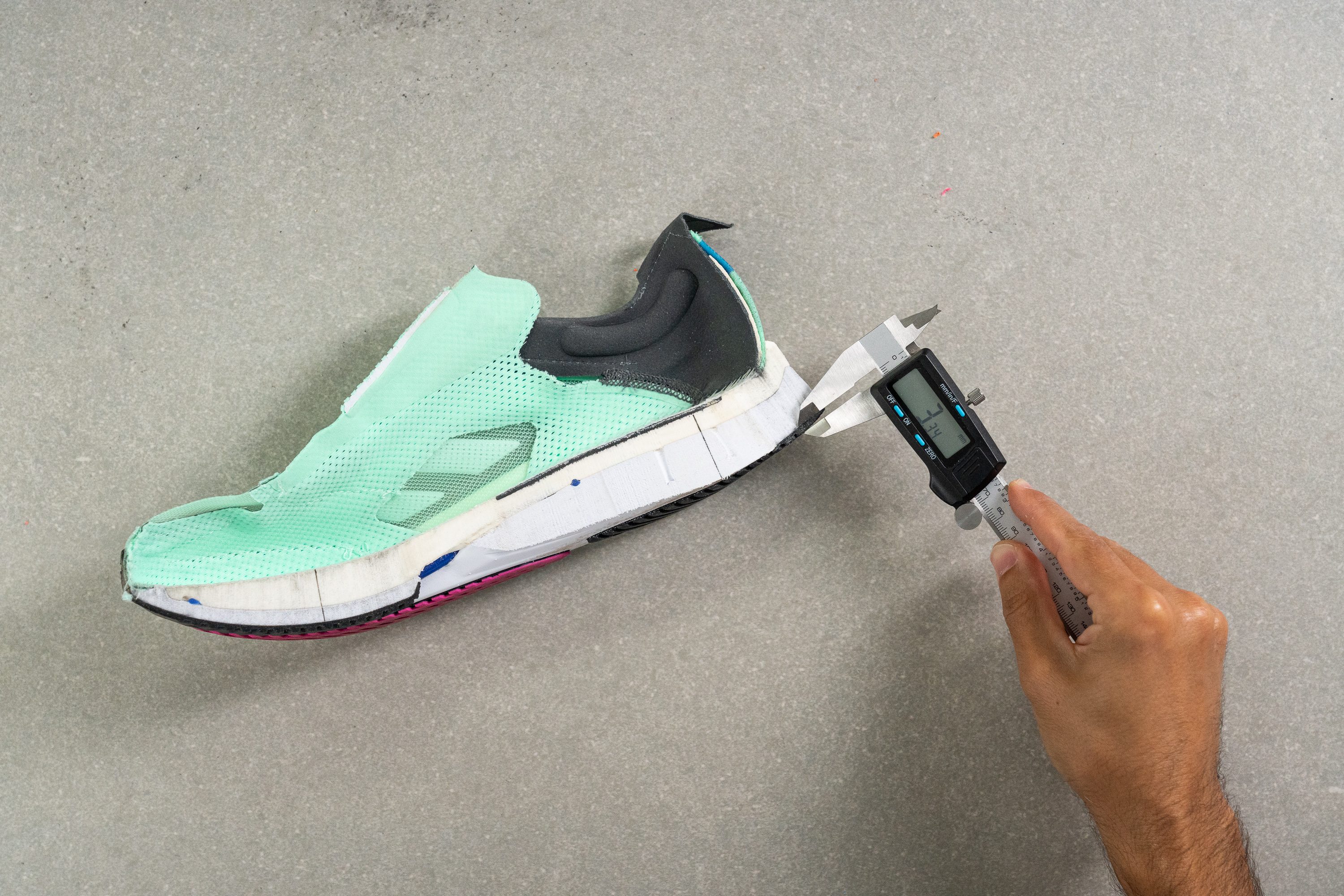
| Adizero Boston 11 | 3.3 mm |
| Average | 3.2 mm |
Misc
Insole thickness
To offset the weight from its thick midsole, as we mentioned before, we noticed in the lab that Adidas has used a few clever methods.
That's why the insole is leaner than those found in most other running shoes on the market.
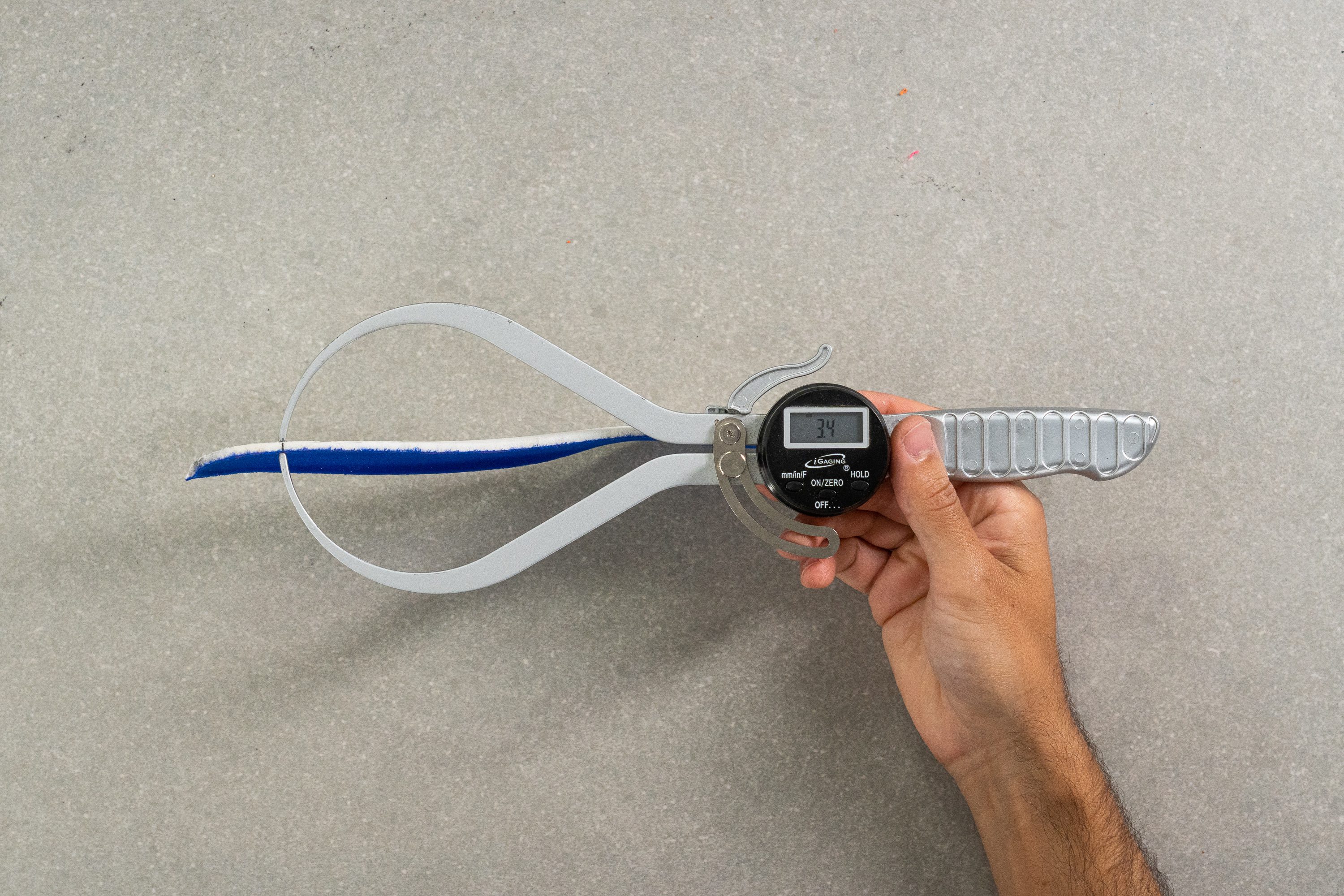
| Adizero Boston 11 | 3.4 mm |
| Average | 4.5 mm |
Removable insole
We encountered no issues whatsoever when inserting our own orthotics or swapping in the insoles from another shoe into the Boston 11.
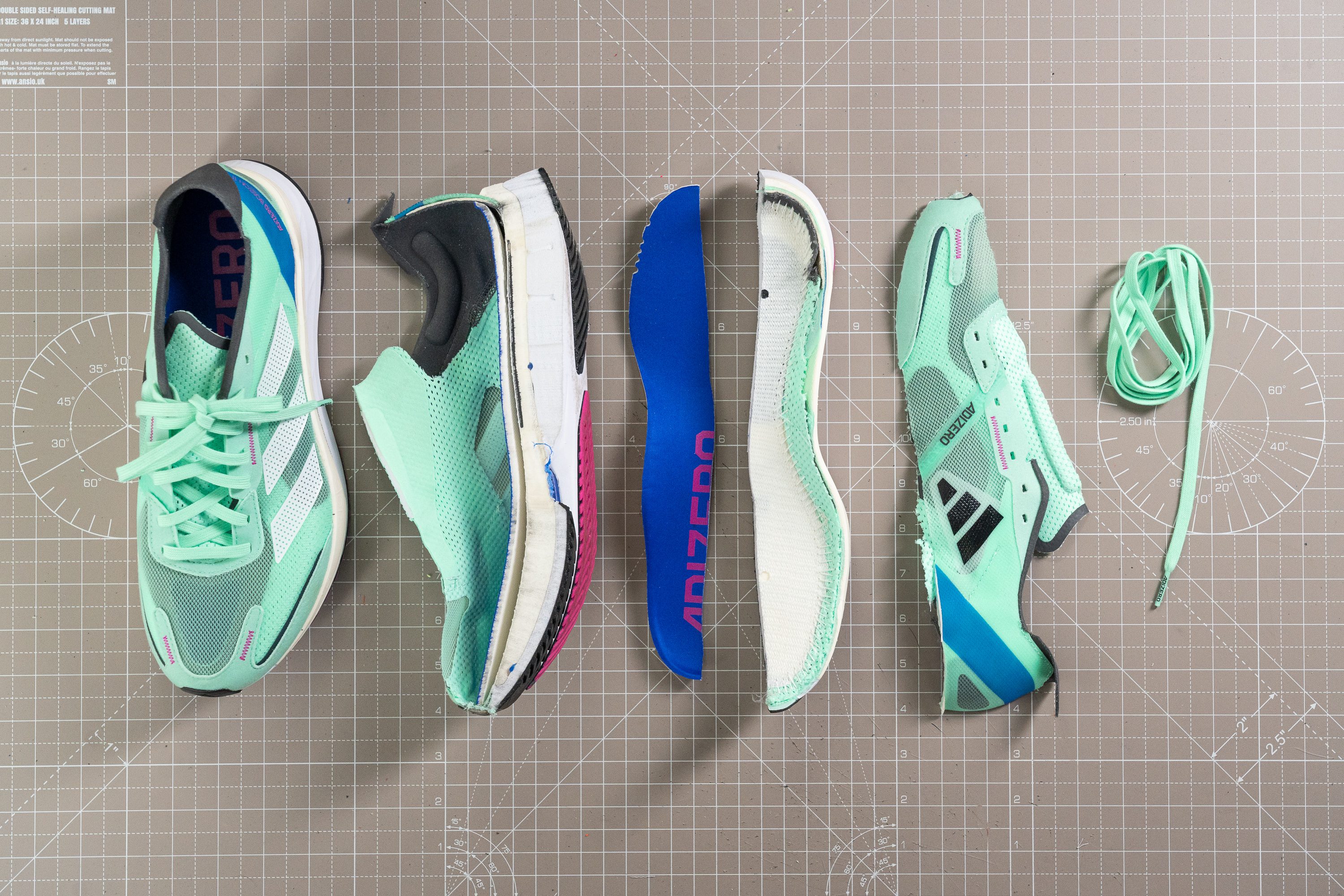
| Adizero Boston 11 | Yes |
Midsole softness in cold (%)
We gave the 11th version of the Boston a brief, 20-minute stint in the freezer before testing it again. After this cold-exposure test, we found the Lightstrike foam to measure 29.5 HA.
That's a jump of 34.1% from its normal state. It's not as good as the typical shoe, but that makes sense considering EVA foam never do well in cold temperatures.
For a deeper understanding of foams and the effects of temperature in running shoes, we suggest looking at both our guides!
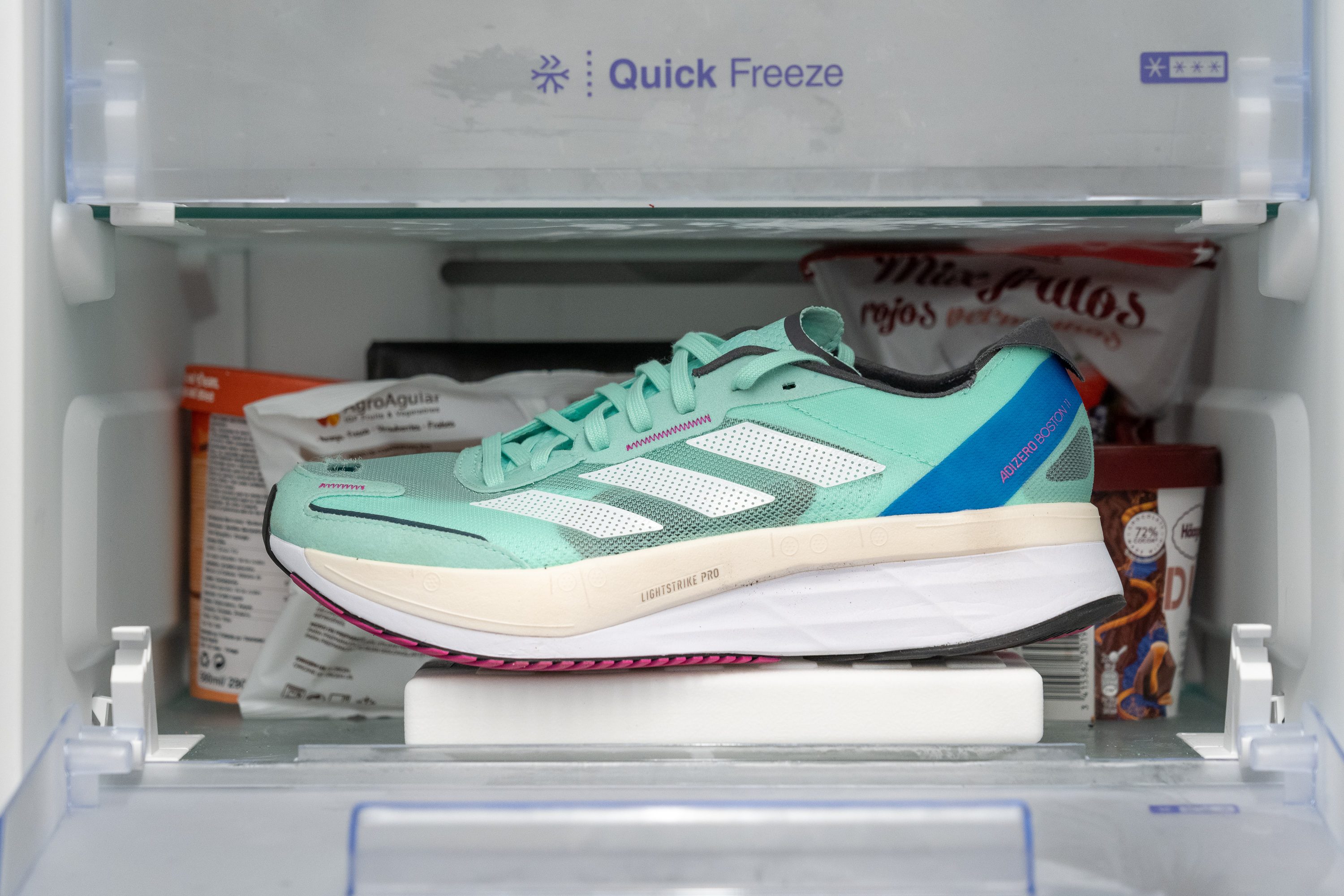
| Adizero Boston 11 | 34% |
| Average | 24% |
Reflective elements
Adidas maintains its track record of omitting reflective elements from its running shoes. Although they've stayed consistent with their design approach, it's disappointing and concerning for us, particularly from a safety perspective.
Night runners really need those reflective components for increased visibility. We certainly hope Adidas revisits this aspect in the Boston 12.
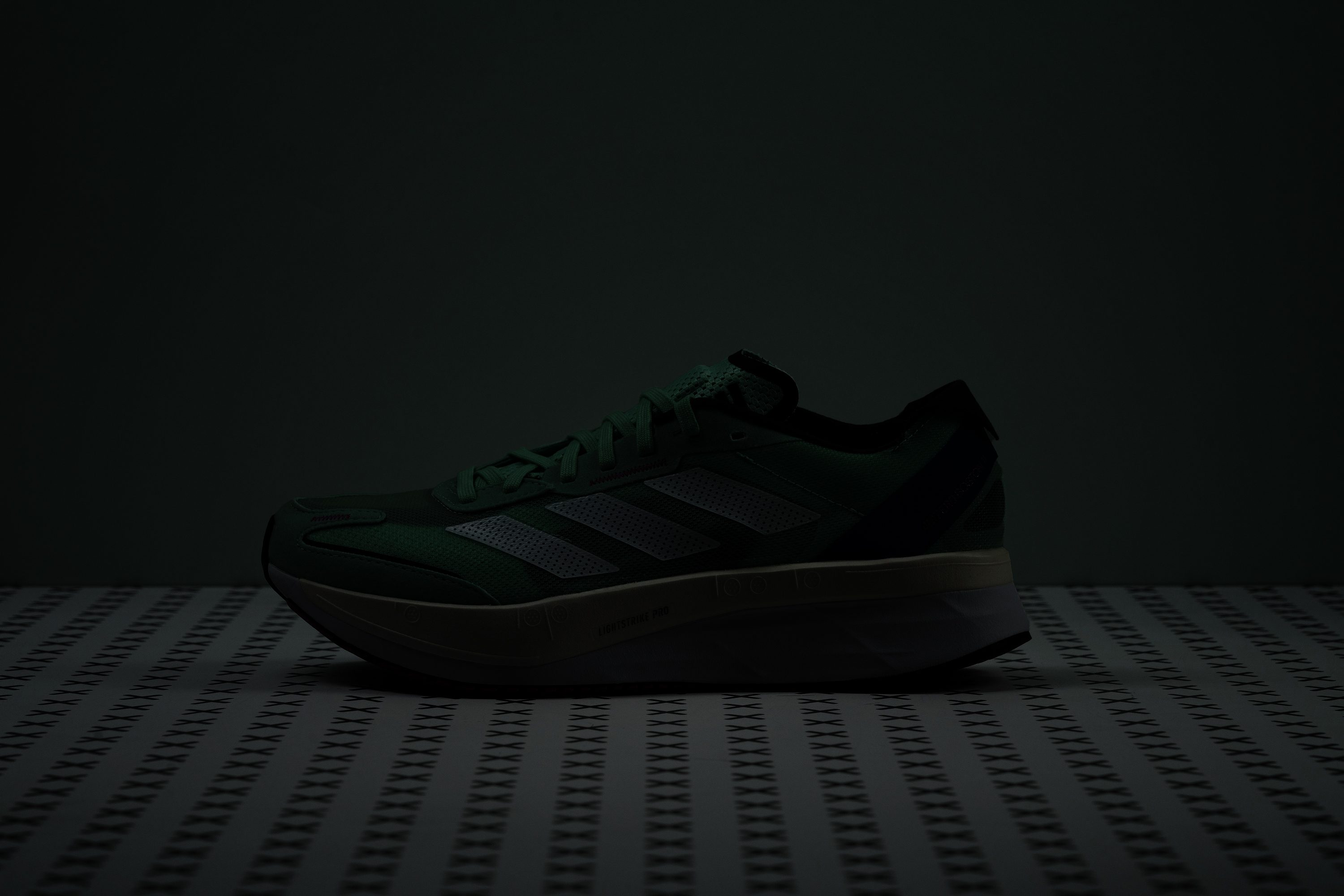
| Adizero Boston 11 | No |
Tongue padding
We found the tongue padding to measure 4.1 mm. This is a surprisingly pleasant result, particularly for a shoe that's specifically designed for tempo runs.
Most training shoes in the Adizero line, like the Adizero Adios 7 with its 1.8 mm padding, sport a much thinner tongue.
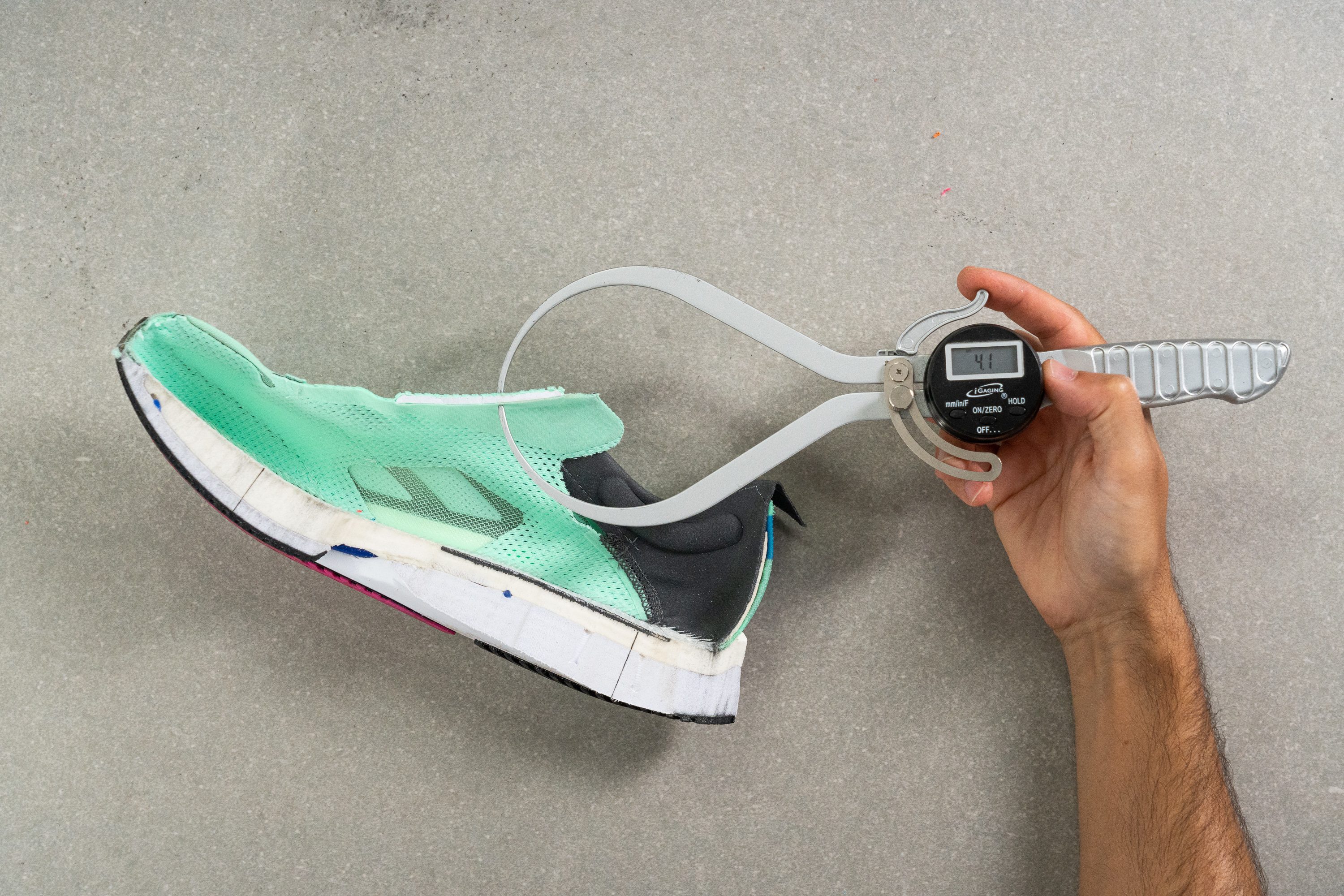
| Adizero Boston 11 | 4.1 mm |
| Average | 5.7 mm |
Tongue: gusset type
The Boston 11 features a fully-gusseted tongue that improves the fit and prevents internal movements.
Although we might have preferred a semi-gusseted design for a more balanced feel, we're fine with this setup.
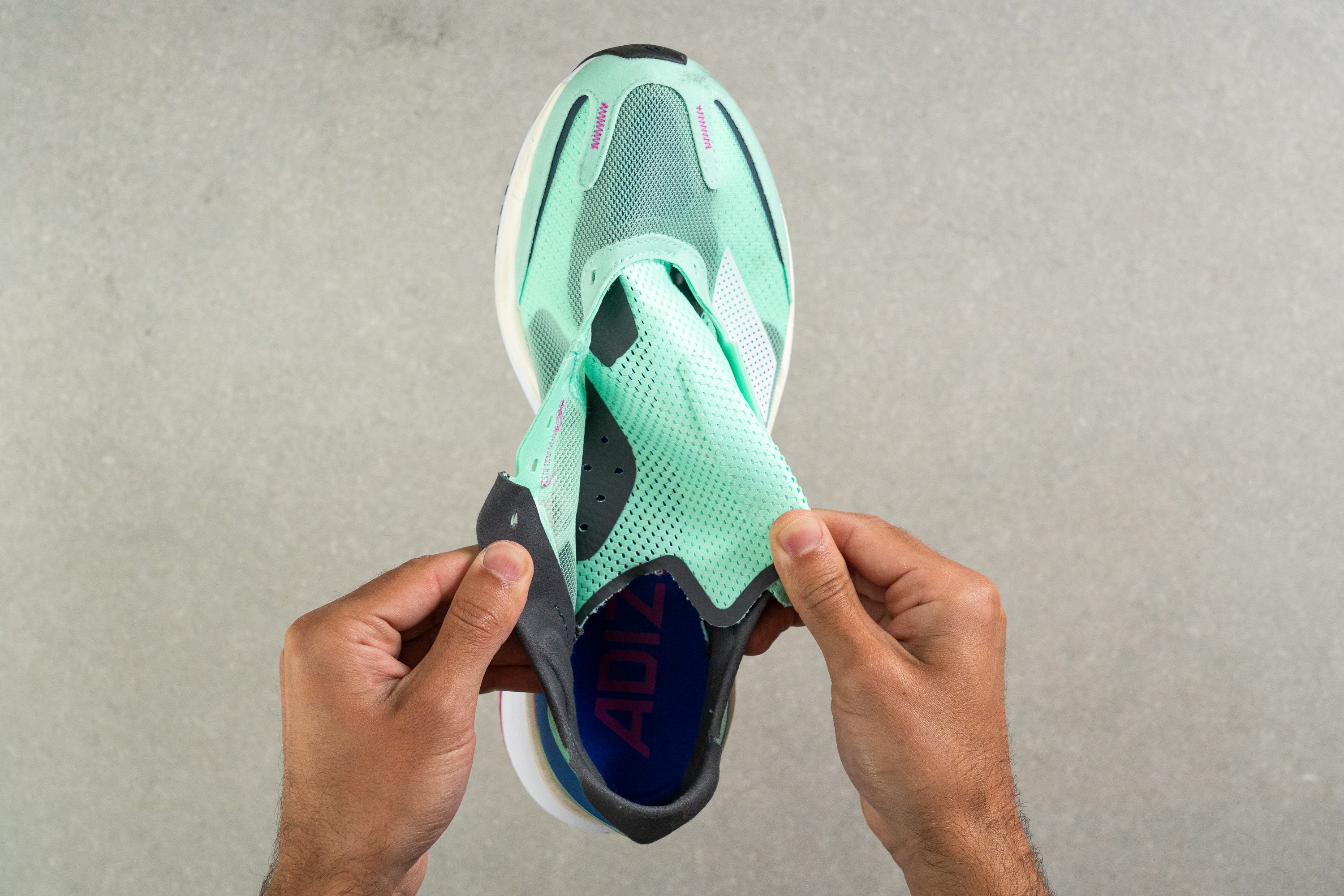
| Adizero Boston 11 | Both sides (full) |
Heel tab
In line with Adidas' latest design trends in running shoes, the Boston 11 features a flap-like pull tab on the heel. This serves two purposes—it makes slipping your foot into the shoe easier and adds a unique aesthetic touch.
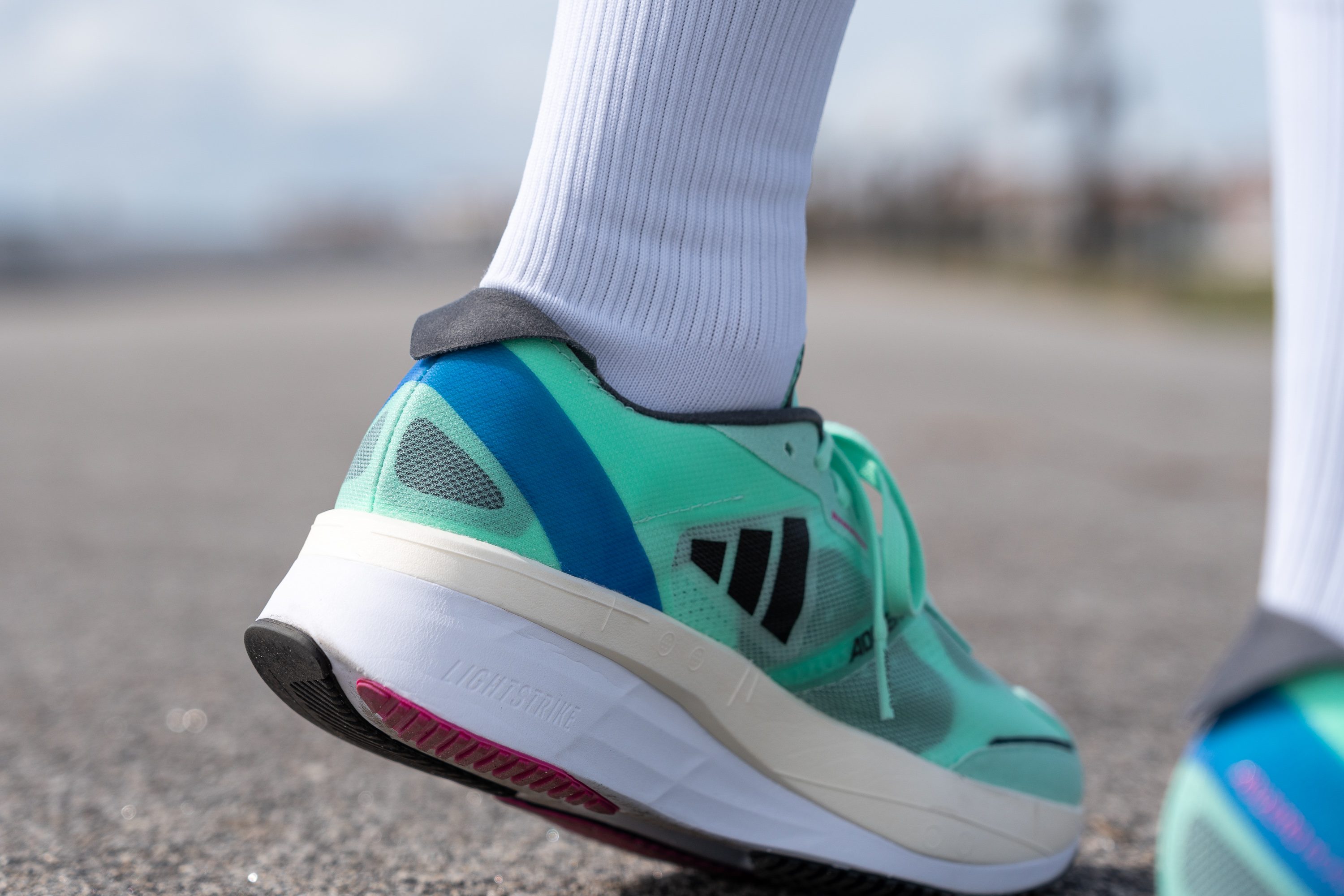
| Adizero Boston 11 | Pull tab |

